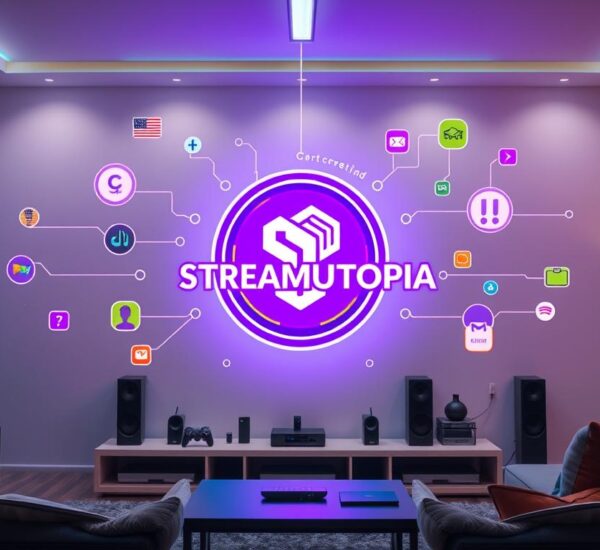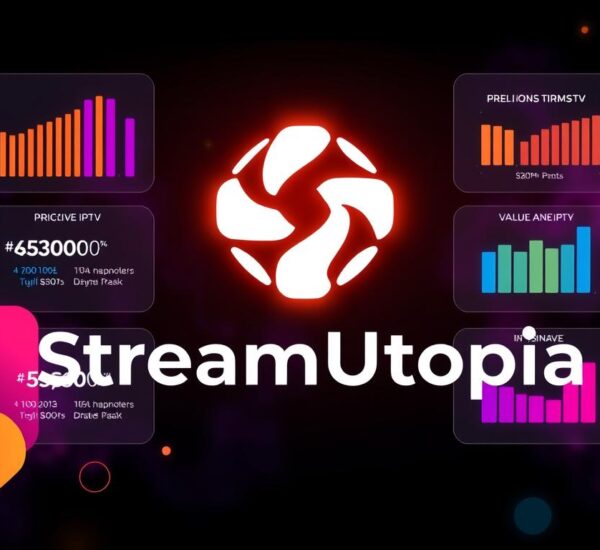Did you know that influencers play a pivotal role in driving engagement for IPTV content? It’s true! By leveraging their authenticity, reach, and targeted strategies, influencers have the power to boost viewership and promote IPTV services to a wide audience.
In today’s digital age, influencer marketing has become a game-changer for brands looking to connect with their target audience. These social media influencers have gained a significant following and the trust of their audience, making them ideal partners for promoting IPTV content. Their ability to create genuine connections and deliver relatable content makes them invaluable assets in influencing consumers’ attitudes and behaviors.
Whether it’s through sponsored posts, product reviews, or interactive campaigns, influencers have the power to not only drive awareness but also encourage users to engage with IPTV content in meaningful ways. Their recommendations carry weight and are often seen as more trustworthy than traditional advertising methods. As a result, they can significantly impact the success and visibility of IPTV services.
In this article, we will explore the various strategies used by influencers to promote IPTV content effectively. We will also delve into the benefits and challenges of influencer marketing in the context of IPTV services. By understanding the role of influencers and their impact on the industry, you’ll gain insights into how to leverage their partnerships to boost your IPTV viewership and create a strong brand presence in the market.
Key Takeaways:
- Influencers have a significant impact on promoting IPTV content and driving engagement.
- Their authenticity, reach, and targeted strategies make them valuable partners for IPTV brands.
- Influencer recommendations are often seen as more trustworthy than traditional advertising.
- By collaborating with influencers, IPTV brands can reach a wider audience and boost viewership.
- Understanding the strategies and challenges of influencer marketing is crucial for leveraging their partnerships effectively.
The Rise of Influencer Marketing
Influencer marketing has become a fundamental component of brand strategies, leveraging the power of influencers to engage with niche communities authentically. These influential individuals, be it fashion gurus, fitness enthusiasts, or tech experts, possess the credibility and trust of their followers. Collaborating with influencers who align with a brand’s values and target demographic allows companies to connect with an engaged audience that has a genuine interest. This strategic approach has propelled influencer marketing to new heights, transforming it into a powerful tool for brand promotion and consumer outreach.
By engaging with influencers who have expertise and influence within specific niches, brands can tap into communities that share a common interest or passion. This targeted approach allows companies to connect with consumers on a personal level, building a sense of authenticity and trust. Whether it’s through product reviews, tutorial videos, or social media campaigns, influencers have the ability to create content that resonates with their audience’s genuine interest, fostering an emotional connection between the brand and the consumer.
Influencer marketing serves as a catalyst for brands to expand their reach and capture the attention of their target demographic. Through collaborations with influencers, brands can tap into existing communities that are already engaged and receptive to the influencer’s content. This established trust paves the way for brands to communicate their message effectively and persuasively, ultimately driving brand awareness, customer acquisition, and customer loyalty.
Furthermore, influencer marketing allows brands to leverage the power of social proof. When influencers endorse a brand or product, their followers perceive it as a genuine recommendation and are more likely to trust and engage with the brand. This social proof is a powerful tool for building credibility, especially in an era where consumers are increasingly skeptical of traditional advertising methods.
With the rise of influencer marketing, brands have experienced a paradigm shift in their promotional strategies. By collaborating with influencers who have a genuine interest and influence within their target demographic, brands can establish credibility, build trust, and engage with audiences in a way that traditional advertising methods often struggle to achieve. As influencer marketing continues to evolve and adapt, it will undoubtedly play a significant role in shaping the future of brand promotions and consumer engagement.
Authenticity and Trust as Cornerstones
Authenticity plays a vital role in influencer marketing. Unlike traditional advertisements, influencer collaborations often feel organic and relatable. Influencers authentically integrate a brand’s product or service into their content, creating a genuine connection with their audience. This resonates better with their followers because the trust established between influencers and their audience is invaluable.
Through organic collaborations, influencers become trusted advisers, recommending products and services that truly resonate with their audience. This trust and authenticity foster a deeper level of engagement. When influencers communicate in a relatable manner, followers feel a genuine connection, making influencer marketing a powerful tool for brands to communicate their message effectively.
Whether it’s through storytelling, personal experiences, or honest reviews, influencers create relatable content that speaks directly to their audience. This relatability builds trust and strengthens the bond between influencers and their followers. As a result, when influencers promote a brand, their audience is more likely to trust and engage with the message.
Authenticity and trust, along with relatable communication, form the foundation of successful influencer marketing campaigns. These cornerstones not only benefit the brand but also provide value and meaningful content to the audience, creating a win-win situation for all parties involved.
Example: How Authenticity Drives Engagements
To illustrate the impact of authenticity in influencer marketing, let’s consider a case study of a beauty influencer collaborating with a skincare brand:
| Influencer | Brand |
|---|---|
| The beauty influencer showcases her skincare routine and shares her personal struggles with acne. | The skincare brand’s products have effectively improved the influencer’s skin, and she genuinely believes in their efficacy. |
| The influencer creates relatable content, discussing her journey to clear skin and the impact of the skincare brand’s products. | The brand emphasizes the importance of natural ingredients and sustainable packaging in their products, aligning with the influencer’s values. |
| Through her authentic content, the influencer builds trust with her audience, who can relate to her experiences. | The brand leverages the influencer’s authenticity to promote its products and connect with the influencer’s engaged audience. |
| The influencer’s followers, appreciating her honesty and expertise, are more likely to try the skincare brand’s products. | The brand benefits from the influencer’s authentic endorsement, resulting in increased brand awareness, engagement, and ultimately, sales. |
Targeted Reach and Engagement
Influencer marketing offers the primary advantage of targeted marketing, allowing brands to reach specific demographics with precision. Through collaborations with influencers, brands can effectively target their ideal customers by leveraging influencers’ deep understanding of audience demographics. This targeted approach ensures that the brand’s message reaches the right audience, resulting in higher engagement rates compared to broader marketing campaigns.
Effective communication plays a crucial role in driving engagement. Influencers have the ability to connect with their followers on a personal level, fostering a sense of trust and authenticity. By effectively communicating a brand’s message through relatable content, influencers create a genuine connection that resonates with their audience.
Higher engagement rates are a natural outcome of targeted marketing and effective communication. When influencer collaborations align with the interests and values of the audience, the audience is more likely to engage with the content, whether through likes, comments, or shares. This heightened level of engagement creates valuable interactions between the brand and its target audience, leading to increased brand awareness, loyalty, and potential conversions.
Benefits of Targeted Reach and Engagement:
- Reaching specific demographics with precision
- Creating a genuine connection with the target audience
- Driving higher engagement rates through relatable content
- Increasing brand awareness, loyalty, and potential conversions
The ability to target specific audiences and communicate effectively are key factors that contribute to the success of influencer marketing campaigns. Through targeted reach and higher engagement rates, brands can maximize their marketing efforts, resulting in a more impactful and relevant connection with their desired audience.
Diversification of Content
Influencer collaborations offer a diverse range of content formats, allowing brands to experiment with different styles and platforms. From engaging Instagram stories and in-depth YouTube reviews to interactive TikTok challenges, influencers have mastered the art of creating content that resonates with their audience.
This versatility in content formats maximizes exposure and impact for brands. By leveraging diverse platforms and styles, influencers can reach a wider audience and capture their attention in various ways. Whether it’s through visually stunning Instagram stories, informative YouTube reviews, or entertaining TikTok challenges, influencer collaborations allow brands to showcase their products or message in creative and engaging ways.
One example of diverse content formats is Instagram stories. These ephemeral posts, consisting of photos, videos, and text, provide a unique opportunity for influencers to share their experiences and promote products in a genuine and authentic manner. Brands can leverage Instagram stories to connect with their target audience, build brand awareness, and drive conversions.
Instagram Stories Example

Image: Example of engaging Instagram stories used by influencers to promote diverse content formats.
YouTube reviews are another powerful content format that influencers excel at. With their expertise and credibility, influencers can provide in-depth product reviews, tutorials, and recommendations, which are highly valued by their audience. Brands can collaborate with influencers to generate buzz and positive sentiment around their products through authentic and informative YouTube reviews.
YouTube Reviews Example
Image: Example of in-depth YouTube reviews that help promote diverse content formats and engage with audiences.
TikTok challenges have become increasingly popular in recent years, captivating a younger demographic. Influencers on TikTok create fun and interactive challenges that encourage their followers to participate and share their own videos. This content format allows brands to tap into the creativity and enthusiasm of the TikTok community, generating user-generated content and enhancing brand awareness.
TikTok Challenges Example
Image: Example of interactive TikTok challenges that can be used to promote diverse content formats and engage with a younger audience.
Experimentation with content styles and platforms is key to staying relevant in today’s dynamic digital landscape. By partnering with influencers, brands can explore different content formats and platforms, adapt to changing trends, and connect with their target audience in meaningful ways.
Measurable ROI and Analytics
Unlike traditional advertising, influencer marketing offers a more measurable return on investment (ROI). Brands have the ability to track various metrics to gauge the effectiveness of their campaigns and make data-driven decisions for future strategies. Let’s take a look at some key analytics that brands can measure in influencer marketing:
- Engagement rates: Brands can assess how well their influencer content resonates with the audience by tracking likes, comments, and shares. Higher engagement rates indicate a higher level of interest and interaction from the audience.
- Clicks: Monitoring the number of clicks on affiliated links or call-to-action buttons provides insights into the interest and intent of the audience.
- Conversions: Tracking the number of conversions, such as purchases, sign-ups, or downloads, enables brands to assess the direct impact of influencer marketing on their business objectives.
- Follower growth: Brands can track the growth and engagement of their own social media channels as a result of influencer collaborations. This metric indicates the extent to which influencer marketing expands the brand’s reach and audience.
By analyzing these metrics, brands can gather valuable insights to refine their influencer strategies, optimize content, and enhance customer targeting. A data-driven approach empowers brands to make informed decisions, ensuring that their influencer collaborations deliver measurable results and contribute to their overall marketing objectives.
Example Analytics Report
| Metric | Value |
|---|---|
| Engagement Rate | 8% |
| Click-through Rate | 12% |
| Conversion Rate | 5% |
| Follower Growth | +10,000 |
The analytics report above showcases the performance of an influencer campaign in terms of engagement, click-through rate, conversion rate, and follower growth. These metrics provide a clear indication of the campaign’s success and allow brands to measure the direct impact of influencer marketing on their business goals.
Challenges and Ethical Considerations
Influencer marketing presents numerous opportunities for brands. However, navigating the landscape comes with its set of challenges. Maintaining authenticity and transparency amidst the industry’s rapid growth has become increasingly critical.
One of the key challenges in influencer marketing is the prevalence of fake followers. Inauthentic accounts artificially inflate an influencer’s reach and engagement, misleading brands about their actual impact. This issue undermines the effectiveness and credibility of influencer campaigns.
Another challenge is undisclosed sponsorships, where influencers promote products or services without disclosing their paid partnership. Lack of transparency erodes trust between influencers and their followers, undermining the authenticity of the endorsement.
Inauthentic endorsements also pose a challenge. When influencers promote products they do not genuinely believe in, it compromises their credibility and risks damaging their relationship with their audience. Brands need to be cautious about partnering with influencers who align with their values and genuinely endorse their offerings.
To address these challenges, industry guidelines and partnerships play a crucial role. Collaborations between influencers and brands should be based on clear guidelines that promote authenticity and ethical practices. These guidelines help establish transparent relationships and ensure that the audience is aware of any sponsored content, fostering trust and enhancing the overall integrity of influencer marketing.
Managing reputation is another critical aspect of influencer marketing. Brands need to proactively monitor and address any negative association resulting from collaborations with influencers. A proactive approach to reputation management helps protect brands from potential backlash and preserves their credibility in the eyes of the audience.
| Challenges | Ethical Considerations | Solutions |
|---|---|---|
| Fake followers | Undisclosed sponsorships | Clear guidelines and transparency in partnerships |
| Inauthentic endorsements | Reputation management | Authentic collaborations and proactive monitoring |

The Future of Influencer Marketing
As technology continues to evolve and consumer behaviors shift, the future of influencer marketing holds exciting possibilities. Brands and influencers alike will need to adapt and innovate to stay ahead in this dynamic landscape. Here are some key trends and considerations that will shape the future of influencer marketing:
1. Rise of Micro-Influencers
Micro-influencers, with their smaller but highly engaged audiences, are expected to gain prominence in the influencer marketing space. These influencers have a more personalized approach and can effectively target niche markets. Brands can leverage micro-influencers to connect with specific audience segments and drive authentic engagement.
2. Personalized Approach
In the future, influencer marketing will become even more personalized. Brands will prioritize building deeper connections with their target consumers. By collaborating with influencers who share their values and resonate with their audience, brands can deliver more tailored and relevant messages, increasing the effectiveness of their marketing campaigns.
3. Regulations and Ethical Considerations
As the influencer marketing industry continues to grow, so will the need for regulations and ethical guidelines. Governments and platforms are tightening their rules around sponsored content and disclosure. Influencers and brands will need to navigate these regulations responsibly, ensuring transparency and maintaining trust with their audience.
4. Further Innovation and Adaptation
The future of influencer marketing will undoubtedly bring further innovation and adaptation. Influencers and brands will explore new technologies and platforms to connect with their audience in innovative ways. Augmented reality (AR), virtual reality (VR), and live streaming are just a few examples of technologies that influencers can leverage to create engaging and immersive content.
By staying ahead of emerging trends and embracing new strategies, influencers and brands can continue to drive successful campaigns in the ever-evolving world of influencer marketing. The future holds exciting opportunities for those willing to embrace change and push the boundaries of what influencer marketing can achieve.
IPTV Services and Their Evolution
In today’s digital era, Internet Protocol Television (IPTV) has emerged as a revolutionary technology that delivers television services over IP-based networks. With the evolution of IPTV, viewers can now enjoy a wide range of content accessible via the internet.
IPTV services provide a plethora of options for viewers to explore. This includes access to live TV channels, allowing users to watch their favorite shows and events in real-time. Additionally, IPTV offers on-demand videos, giving viewers the freedom to watch movies, series, and other content whenever they desire. Moreover, IPTV services incorporate interactive features, enabling users to engage and interact with the content they are consuming.
One notable advantage of IPTV services is their flexibility. Unlike traditional television services that are limited to specific locations or devices, IPTV can be accessed on multiple devices, including smart TVs, smartphones, tablets, and computers. This means that viewers can enjoy their favorite content anytime, anywhere, as long as they have an internet connection.
The Popularity of IPTV Services
The popularity of IPTV services can be attributed to several factors. Firstly, the flexibility in content consumption appeals to viewers who want to customize their viewing experience. With IPTV, users have control over what they watch, ensuring they have access to their preferred shows, movies, and videos.
Additionally, the extensive range of content available on IPTV services caters to different interests and preferences. Whether viewers enjoy sports, news, entertainment, documentaries, or other genres, IPTV offers a diverse selection of channels and on-demand content.
The interactive features of IPTV services further enhance the viewing experience. Users can engage with their favorite programs through features like real-time chat, voting, and interactive quizzes, making television viewing a more immersive and participatory activity.
| Benefits of IPTV Services | Examples |
|---|---|
| Access to live TV channels | Watch news, sports, and entertainment channels in real-time. |
| On-demand videos | Enjoy movies, series, and other content whenever you want. |
| Interactive features | Engage with content through real-time chat, voting, and interactive quizzes. |
| Flexibility | Access IPTV services on multiple devices, anytime, anywhere. |
| Wide range of content | Catering to diverse interests and preferences. |
Overall, the evolution of IPTV services has transformed the way we consume television content. With its flexibility, variety, and interactive features, IPTV has become a popular choice for individuals seeking a personalized and immersive viewing experience.
The Impact of Social Media Integration in IPTV Services
Social media integration has revolutionized the way users interact with IPTV content, enhancing the overall viewing experience and fostering a sense of community among users. By seamlessly integrating social media platforms, IPTV services have embraced content sharing, real-time interaction, content discovery, user-generated content, and enhanced engagement, transforming television consumption into an interactive and engaging journey.
Seamless Content Sharing
With social media integration, IPTV users can easily share their favorite content, such as captivating TV shows, thrilling sporting events, or thought-provoking documentaries, with their online communities. Whether through direct messaging or sharing on public platforms such as Facebook, Twitter, or Instagram, users can amplify the reach of IPTV content, sparking conversations and influencing others to join the viewing experience.
Real-Time Interaction during Live Events
One of the biggest advantages of social media integration in IPTV services is the ability for users to engage in real-time discussions and interactions during live events. By using hashtags, sharing thoughts, and participating in polls or live chats, viewers can actively engage with fellow enthusiasts, creating a shared experience that goes beyond passive television watching.
Content Discovery through Recommendations
Social media integration enables IPTV platforms to leverage algorithms and user preferences to provide personalized content recommendations. By analyzing users’ viewing habits, interests, and social media interactions, IPTV services can suggest relevant content that aligns with individual preferences, ensuring an enhanced and tailored viewing experience.
User-Generated Content Creation
Social media integration empowers IPTV users to become content creators themselves. By encouraging viewers to generate their own videos, reviews, or reactions to IPTV content, platforms foster creativity and user engagement. User-generated content adds a layer of authenticity and diversity, creating a vibrant community of content producers and consumers.
Enhanced Engagement through Contests and Quizzes
Integrating social media into IPTV services allows for interactive experiences such as contests, quizzes, and challenges. Through these interactive elements, viewers can actively participate and compete, fostering a sense of excitement and engagement. By rewarding participation or sharing results on social media, IPTV platforms further encourage users to interact with the content and connect with others.
Social media integration has transformed the landscape of IPTV services, bridging the gap between television and online communities. By embracing seamless content sharing, real-time interaction, content discovery, user-generated content, and enhanced engagement, IPTV platforms have succeeded in creating a dynamic and interactive viewing experience that keeps audiences captivated and connected.
Conclusion
Influencers play a crucial role in promoting IPTV content by leveraging their authenticity, trust, and targeted reach. Their collaborations with brands help create genuine connections with the audience and drive higher engagement rates. By partnering with influencers who align with a brand’s values and target demographic, companies can tap into an engaged audience with a genuine interest in IPTV.
Additionally, the integration of social media in IPTV services has transformed the viewing experience. It enables seamless content sharing, real-time interaction, and enhanced engagement through user-generated content and interactive features. This integration fosters a sense of community and amplifies the reach and impact of IPTV content.
For those interested in starting an IPTV reselling business, becoming a middleman between IPTV service providers and customers offers opportunities for passive income and business growth. By understanding the IPTV market, selecting a reliable provider, implementing effective marketing strategies, and providing excellent customer support, entrepreneurs can tap into the thriving industry and build a successful reselling business.
FAQ
What is the role of influencers in promoting IPTV content?
How does influencer marketing benefit IPTV promotion?
What makes influencer collaborations more authentic than traditional advertisements?
How do influencer collaborations drive higher engagement rates in IPTV promotion?
What content formats can influencers use to promote IPTV?
How can influencer marketing help measure the ROI of IPTV promotion?
What are the challenges and ethical considerations in influencer marketing?
How will influencer marketing adapt in the future?
What is IPTV and how has it evolved?
How does social media integration impact IPTV services?





